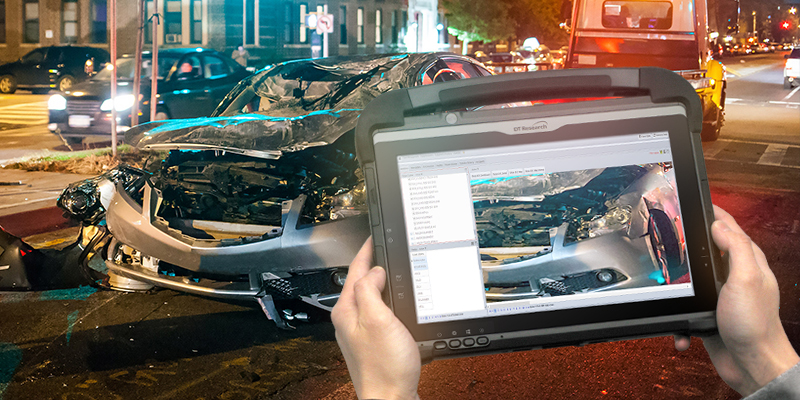
Law enforcement, like many other aspects of modern life, has become increasingly digital. Every crime today can generate a wealth of digital evidence, from cell phone data and surveillance footage to information from fitness trackers and IoT devices. Digital data is a valuable asset for solving crimes, it also presents significant challenges, particularly for understaffed law enforcement agencies that must sift through vast amounts of information manually.
Fortunately, law enforcement can leverage technology to manage this influx of digital data effectively. Three key technology advancements are enabling law enforcement modernization: cloud computing, artificial intelligence (AI), and edge solutions. Among the tools that bring these technologies to the field, rugged tablets and laptops stand out for their versatility and durability, helping officers work efficiently in various environments. This article explores how these advancements, combined with rugged tablets, are revolutionizing law enforcement.
1. Cloud Computing: Enhancing Data Storage and Collaboration
The sheer volume of digital evidence law enforcement agencies must manage is staggering. Body camera footage alone can consume terabytes of data storage space, far exceeding the capacity of traditional onsite hardware. Cloud computing offers a solution by providing scalable, offsite storage that can accommodate the growing data needs of law enforcement.
Benefits of Cloud Computing:
- Scalable Storage: Cloud platforms can easily scale to store large volumes of digital evidence, ensuring that agencies do not run out of storage space.
- Faster Case Progression: Cloud solutions enable quicker access to digital evidence, allowing investigators to share links to required information seamlessly. This speeds up the investigative process and improves collaboration between different departments and agencies.
- Secure Chain of Custody: Cloud technology ensures a reliable chain of custody by automatically logging who accessed the evidence and when. This enhances the integrity and trustworthiness of the evidence.
Rugged tablets equipped with cloud access allow officers to upload and retrieve data in real-time, whether they are at a crime scene or in transit. This instant access to information is crucial for making timely decisions and advancing investigations swiftly.
2. Artificial Intelligence: Accelerating Data Analysis and Decision-Making
Artificial intelligence has the potential to transform law enforcement by automating the analysis of large datasets and providing actionable insights rapidly. AI applications such as facial recognition, word recognition, and predictive analytics are already making significant impacts in various areas of policing.
Key AI Applications in Law Enforcement:
- Facial and Word Recognition: AI can quickly scan through video footage or text documents to identify persons of interest or extract relevant information, tasks that would take humans days or weeks to complete.
- Predictive Analytics: AI can identify patterns and connections that are not immediately apparent, helping investigators link seemingly unrelated individuals or incidents.
- Optimized Resource Deployment: Computer-aided dispatch (CAD) systems powered by AI can analyze the skills and equipment of available units and consider traffic conditions to deploy the best-suited response teams rapidly.
Rugged tablets and laptops serve as the perfect platform for deploying AI tools in the field. Officers can use these tablets to access AI-powered applications, receive real-time alerts, and make informed decisions based on comprehensive data analysis.
3. Edge Computing and IoT: Improving Field Operations and Asset Management
Law enforcement is inherently a field-based activity. Officers, supplies, and evidence are constantly in motion, requiring robust and reliable technology to manage operations efficiently. Edge computing and the Internet of Things (IoT) provide solutions to these challenges by bringing data processing closer to where it is needed and enhancing asset management.
Advantages of Edge Computing and IoT:
- Real-Time Data Processing: Edge computing allows data to be processed locally on rugged tablets, enabling faster decision-making and reducing latency.
- Asset Management: RFID tagging and IoT sensors help track the location and usage of equipment, ensuring that necessary items are always available and properly accounted for.
- Enhanced Situational Awareness: IoT devices, such as smart streetlights and weather sensors, provide valuable data that can enhance situational awareness and support proactive policing efforts.
Rugged tablets and laptops integrated with IoT and edge computing capabilities enable officers to conduct more work in the field rather than being tethered to a desk. This mobility ensures that officers can access and input data on-the-go, improving their efficiency and effectiveness.
Embracing Technology for a Safer Future
As digital evidence continues to grow in volume and importance, law enforcement agencies must embrace modern technologies to stay ahead. Cloud computing, artificial intelligence, and edge solutions, when integrated with rugged tablets, provide a comprehensive approach to managing digital data and enhancing field operations. These advancements not only accelerate the investigative process but also ensure the safety and well-being of officers by equipping them with the tools they need to perform their duties effectively.
By leveraging these technological advancements, law enforcement agencies can better serve their communities, solve crimes more efficiently, and maintain the trust and confidence of the public. Rugged tablets, in particular, play a crucial role in this modernization, providing a durable and versatile platform that supports the dynamic nature of police work.

